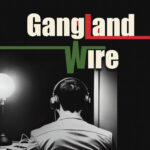Podcast: Play in new window | Download
Subscribe: Apple Podcasts | Android | RSS | More
Paul Ricca – the beginnings
In this episode, Gary examines the life of a young Italian immigrant named Paul Ricca who started his mob career with murder. He fled to Cuba in 1920. Once safely in Cuba, Ricca had the good fortune to meet a member of the Camorra mafia named Giuseppe Esposito who was known as “Diamond Joe” and a well-known leader in Chicago’s bootlegging business. Diamond Joe was just beginning to form a bootlegging gang and had joined with Sam Giancana and his Chicago street gang known as the 42 Gang. When Ricca arrived at the Italian section of Chicago he reconnected with Diamond Joe and went to work as a waiter in a restaurant owned by his mentor. Modern mob historians believe that was the source of his moniker. Paul Ricca was a very pleasant and charismatic young man who soon made many friends among the mobster of the day. One of these new friends was Al Capone who soon hired Ricca into his organization. He rose quickly in the Capone organization and was close personal friends with Capone He was Capone’s best man at his 1927 wedding.
The rise of Paul the Waiter
When the government convicted Capone and sent him to the Atlanta U.S. Penitentiary, he obtained Frank Nitti’s agreement that he would promote Paul Ricca to be the new underboss of the Outfit. Nitti was a poor excuse for a boss and the intelligent and resourceful Ricca would become the boss in reality while Nitti was the known boss. As a matter of fact, Charles “Lucky” Luciano refused to deal with Nitti and demanded that Ricca became Chicago’s contact with the National Crime Syndicate. Ricca would even overrule Nitti’s orders and Nitti never seemed to mind.
Paul Ricca and the Hollywood Scam
Prohibition ended in 1933 and the Chicago Outfit moved west to the untapped markets in Hollywood California. The Outfit saw the film industry as a huge cash cow just waiting to be milked. Ricca sent Johnny Roselli out with a plan to infiltrate labor unions involved with the film industry. Once they got control of those unions, they used another mobster named Willie Bioff to extort money from the Hollywood moguls of the time. Bioff had already created a shakedown operation of Chicago movie theater projectionists and the National Union of Theater Projectionists. Bioff infiltrated the International Alliance of Theatrical Stage Employees and began to extort millions of dollars from major motion-picture studios. Bioff got a little too big for his britches and started living a lavish Hollywood lifestyle with a mansion, expensive suits, gold jewelry, expensive cars, and solid gold business cards.
Actor Robert Montgomery, president of the Screen Actors Guild tipped off the IRS and a California federal grand jury was called to investigate. Bioff was indicted for tax evasion and related crimes, as well as extortion and racketeering in 1943. Bioff was unable to stand the thought of prison so he testified against Chicago Outfit bosses Paul “The Waiter” Ricca, Philip D’Andrea, Charlie “Cherry Nose” Gioe, Johnny Roselli, Lou Kaufman, and Frank “The Enforcer” Nitti.
Book Promo for the Crooked Sourwood: Kentucky’s Forgotten Tragedies
Click on this title to learn more about this Crooked Sourwood: Kentucky’s Forgotten Tragedies by Steven Wright.
Show Notes by Gary Jenkins
Support the Podcast
Hit me up on Venmo for a cup of coffee or a shot and a beer @ganglandwire
To go to the store or make a donation Click Here.
To rent Brothers against Brothers, the documentary, click here.
To rent Gangland Wire, the documentary, click here
To subscribe on iTunes click here, please give me a review and help others find the podcast


A well-covered story of a powerful Outfit boss. I didn’t know he was really a waiter.
Do you know anything about the serious dispute between Accardo and Ricca in the early 1950’s that was so bad that leaders of the New York Genovese family had to travel to Chicago to mediate and try and resolve before the killings started.
I have not heard about that dispute. It might have been over Giancana refusing to let Cerone be a partner with him in running the Outfit.
Thank You! Scott, I need to do more Chicago.